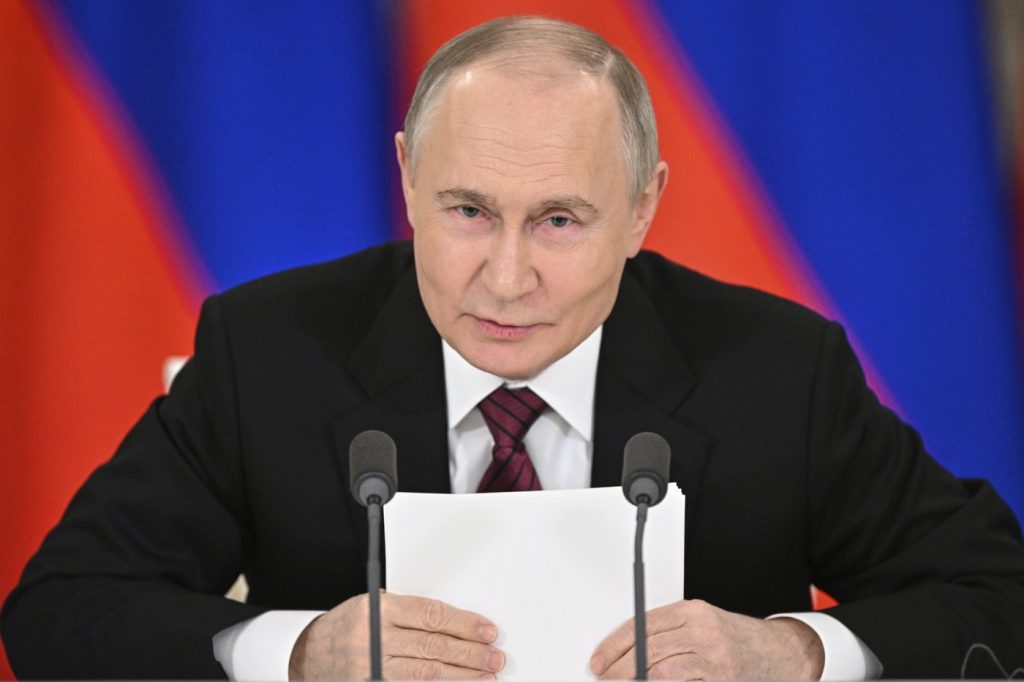TALLINN, Estonia (AP) — After numerous discussions held in various global capitals, attention has now shifted to Istanbul as the site for potential peace negotiations aimed at concluding Russia's three-year-long full-scale invasion of Ukraine. Russian President Vladimir Putin proposed resuming direct peace talks on Thursday in Istanbul, a city that bridges Europe and Asia. Ukrainian President Volodymyr Zelenskyy responded by inviting Putin to attend the meeting in person, emphasizing that he would only agree to talks with the Russian leader directly.
The specifics of the meeting remain uncertain. The Kremlin has not confirmed Putin's attendance or who else will accompany him to Turkey. Mykhailo Podolyak, an adviser to Zelenskyy, stated that the Ukrainian president would only engage with Putin during the negotiations.
Zelenskyy insisted that if Putin does not attend, it would signal the Russian leader's unwillingness to end the war. The talks' origins trace back to a meeting held on Saturday, where Zelenskyy hosted a coalition of Western leaders, including French President Emmanuel Macron, U.K. Prime Minister Keir Starmer, German Chancellor Friedrich Merz, and Polish Prime Minister Donald Tusk. This gathering culminated in a joint call for a 30-day ceasefire in Ukraine.
This ceasefire proposal garnered support from the European Union and U.S. President Donald Trump, who promised tougher sanctions against Russia if Putin rejected the ceasefire. However, early Sunday, Putin appeared to dismiss the ceasefire offer entirely, instead advocating for talks "without preconditions" in Istanbul. He did not clarify whether these discussions would involve him and Zelenskyy personally or be conducted at a lower level.
Zelenskyy expressed his willingness to visit Turkey for the talks, challenging Putin to do the same and expressing hope that Russia would not seek excuses to avoid the meeting. When pressed for details about Russia's representatives in Istanbul, Kremlin spokesman Dmitry Peskov remained vague, reiterating that Putin's position on negotiations was clear.
Meanwhile, Trump's administration had initiated separate discussions with both Russia and Ukraine in Saudi Arabia since March but indicated a potential withdrawal from the process if no progress was achieved. Trump conveyed optimism about the upcoming talks, suggesting he might attend but ultimately stated that Secretary of State Marco Rubio and other U.S. officials would represent the nation in Turkey.
Podolyak clarified that the Ukrainian leader would not engage with any Russian officials other than Putin in Istanbul. Though there are officials in Zelenskyy's entourage capable of conducting negotiations, he argued that only Putin has the authority to make critical decisions regarding the war's continuation or cessation.
Zelenskyy also planned to meet with Turkish President Recep Tayyip Erdogan in Ankara and would wait there for the potential meeting with Putin. Should Putin fail to attend, Zelenskyy warned that European and U.S. leaders should impose additional sanctions on Russia.
The potential talks in Istanbul are being described as a "restarting" of negotiations that had initially taken place in the city in 2022 but collapsed swiftly. During those earlier discussions, Russia accused Ukraine and the West of prolonging the conflict, while Ukraine claimed that Russia's demands were essentially ultimatums rather than negotiable terms.
Zelenskyy characterized the Russian delegation's demands during the 2022 talks as non-negotiable, which included Ukraine recognizing Russian control over the Donbas region and making constitutional amendments toward neutrality. Conversely, Putin argued that Ukraine had abandoned a pre-agreed peace deal. The Kremlin has frequently asserted that the Istanbul agreements could serve as a foundation for future talks.
In terms of demands for ending the war, Putin insists that Ukraine must cede territories he considers Russian, including the Donbas and Crimea, renounce NATO membership ambitions, and significantly reduce its military capabilities. Ukraine, however, has firmly rejected land concessions and seeks stringent security guarantees against future Russian aggression. Trump stated that Crimea would remain with Russia and that Ukraine's NATO aspirations were unlikely to materialize.
On the battlefield, As both sides prepare for warmer weather operations, high casualty numbers plague the conflict. Russia reportedly replenishes its front-line units with new recruits, aiming to maintain offensive operations. Recently, Russian forces claimed territorial gains in various areas along the approximately 1,000-kilometer front line, while Zelenskyy warned of delays in peace talks as Russia gears up for more significant offensives.
Past attempts to initiate ceasefires have largely failed, including a recent proposal for a 30-day truce, which Russia dismissed. Instead, the Kremlin orchestrated short, unilateral ceasefires during holiday periods, leading both sides to accuse each other of failing to uphold the terms. March saw a failed agreement to halt attacks on energy infrastructure, a pledge marred by mutual allegations of violations.










